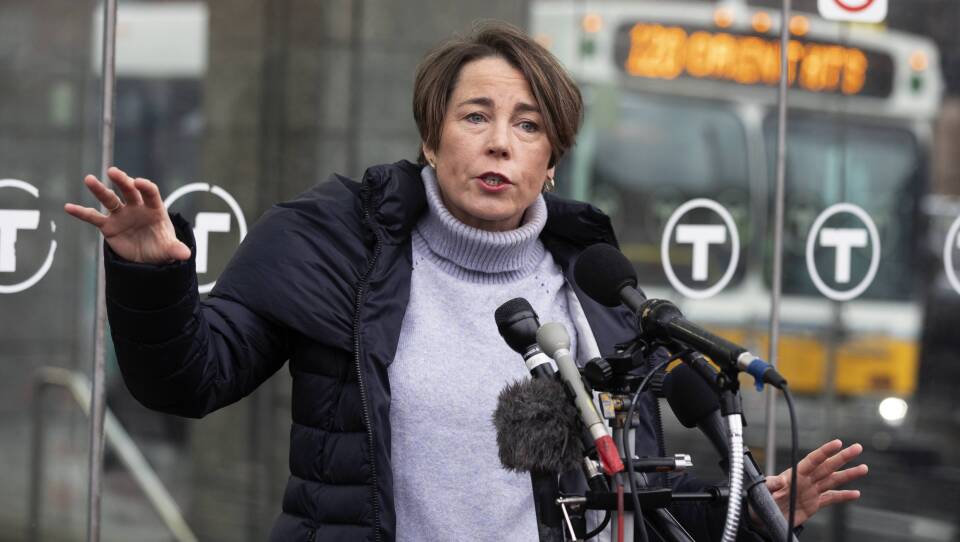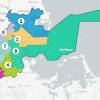Every week, GBH News assignment editor Matt Baskin joins GBH’s All Things Considered to look at stories the newsroom is following. This week, reporters will be covering the impact of a seemingly late nor'easter, the local reverberations of bank collapses, and a federal court challenge to Boston's recently redrawn voting district maps. What follows is a lightly edited transcript of the conversation between Baskin and host Arun Rath.
Arun Rath: So the start of spring is only a week away, with winter coming to an end — well, we already know that winter is not necessarily coming to an end with spring in Massachusetts. But we're supposedly getting the first big snow event tomorrow, blasting a big, long time. How are we handling this big, impending massive snowstorm that we're told is happening?
Matt Baskin: Well, as I think, you know, I'm a little bit allergic to making a big, big deal out of winter weather. This is New England; we can cope. And how many times have we had a nor'easter in the forecast that turns out to be a dud?
That said, as you note, it's late in the season to be getting what seems like it could be our first serious snow of the year, at least in Eastern Mass. Supposedly, what this is going to look like is a lot of rain overnight with snow starting mid- to late-morning west of the city and in the early afternoon closer to the coast. We seem to be looking at about 8 inches around Greater Boston, up to a foot-and-a-half for points north and west.
And again, in terms of timing, you're right, it's not at all unprecedented for us to get big snowstorms in March or even April. Back in 1997, we actually had a huge blizzard on April Fool's Day. I was in elementary school and I remember getting a surprise snow day.
As far as what our coverage is going to look like, I don't think it's a good use of our reporters' time to go roaming through grocery stores to see how much milk and bread is still on the shelves. What we do will be about impact: what does this mean for schools; what does this mean for roads; and, of course, what does this mean for the T?
You know, it's funny, it was eight years ago — 2015 — when the state's new governor, Charlie Baker, was just settling into office when Massachusetts got slammed with back-to-back-to-back snowstorms that crippled the T. Eight years later, Maura Healey is the new governor who's been on the job just a couple of months, the T is in absolute shambles, and here comes the snow. So this could be an interesting stress test for a transit system that's been stumbling and then some.
Rath: And speaking of stress tests, the banking world is dealing with a big one right now. We saw the collapse of the Silicon Valley Bank and Signature Bank. Silicon Valley Bank in particular is known for funding startups, which might have been part of its problem. But that means that's reverberating locally, right?
Baskin: It sure is. There are all sorts of startups and tech companies in Massachusetts that did their banking through SVB, and this has made for several very stressful days for them. They've been worried about everything from the basic responsibility of paying their workers on time to the very future of their businesses.
It's important to say that this goes beyond just corporate players, too. Our journalists have heard that there are folks in and around Boston who had mortgages through SVB, we understand that SVB was a lender for some affordable housing projects that are in progress [and] some nonprofits may have apparently been impacted. Our colleague Sarah Betancourt has been reporting on this today. You'll probably be hearing her in your newscast coming up. And we'll have a story from her online at GBHNews.org, looking at how the tentacles of this screwup are extending far beyond Silicon Valley and affecting people here in Massachusetts.
Rath: Finally, Matt, it's been a little while since we've heard about Boston's plan to remap its voting districts. Things got pretty heated in the City Council as it was being debated. Andthis is headed to court now?
Baskin: That's right. Let me start with some background. In November, the City Council voted on and Mayor [Michelle] Wu signed a plan to redraw voting lines in the city. One of the goals was to give voters of color a better shot at exercising their power and improving the representation. But while this was under debate, City Councilor Frank Baker complained that the new districts would dilute the voting power of white Catholics in parts of Southie and Dorchester, his district, District 3. And he actually went so far as to suggest that this was some sort of inside job motivated by sectarianism, because the key city councilor behind the new map, Liz Breadon, is a Protestant originally from Northern Ireland. Baker was roundly and immediately condemned. He apologized. The new map passed 9-4 and mayor who signed it.
So that was all four months ago. Now, folks who oppose the new map who lost out in the City Council are hoping they can win in a new venue, namely federal court. The plaintiffs, led by Robert O'Shea, who's the chair of the Democratic Committee in Ward 6 in Southie, argued that the map approved by the City Council and Mayor Wu is in violation of everything from Boston City Charter up to and including the United States Constitution. Their complaint raises concerns about splitting up votes in some big public housing projects between districts, and it claims that, as drawn, the map would disempower white voters.
A couple city councilors are prepared to testify against the map process behind it. Not Frank Baker, but his colleagues Michael Flaherty and Ed Flynn. Flaherty is an at-large councilor representing the whole city. Flynn, son of former Mayor Ray Flynn, represents District 2, which includes parts of Southie and stands to shed some voters under the map in question, they'd be shifted into District 3. And Congressman Stephen Lynch is also on deck to testify. His congressional district includes parts of Boston we're talking about. And he, too, opposes this map.
There's a hearing in federal court scheduled for tomorrow and we'll be covering it.
Rath: Super interesting. I'm glad we're going to be on top of this map. Thank you.
Baskin: You got it.









